

Advice: Should you get your PhD? “An investment in knowledge pays the best interest.”

Testing education: Pisa envy. Life Sciences Salary Survey 2012. Salaries hinted at a recovery last year after a noticeable dip in 2010—the first-ever drop in The Scientist’s 10-year history of surveying the life science community.
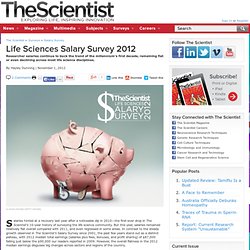
But this year, salaries remained relatively flat overall compared with 2011, and even regressed in some areas. In contrast to the steady growth observed in The Scientist’s Salary Survey since 2001, the past few years stand out as a distinct plateau, with 2012 median total earnings (salaries plus fees, bonuses, and profit sharing) of $87,000 falling just below the $90,000 our readers reported in 2009. However, the overall flatness in the 2012 median earnings disguises big changes across sectors and regions of the country.
This year’s high-scoring disciplines included bioengineering, biophysics, and food/nutrition science. Industry Tops Academia Stability Across Job Type The 2012 salary survey shows a great range of trends in job activities. In Conversation: Research funding. It’s hard to argue with the importance of research, particularly medical research.

It leads to breakthroughs and can change people’s lives for the better. But there are some crucial questions about how we fund research in Australia – who gets the money? How much? And are there ways to get more bang for our buck? In a tight fiscal climate, these questions become all the more important as governments and research funding groups seek to stretch their dollar further. Shadow finance minister, Andrew Robb chairs the coalition’s Policy Development Committee and has been speaking out lately on the party’s policy direction in research funding.
Academia's Money Troubles. Reasons Not to Pursue a PhD. Advice: Should you get your PhD? Science Forum: "Hiding your PhD" The problem is that there are 500 hunters looking to eat 300 bears, and when you get hungry enough rabbits start looking pretty good to eat.What we're seeing is desperation for employment.
Congratulations, College Graduate. Now Tell Us: What Did You Learn? What is a PhD really worth? : Naturejobs. To Apply or Not to Apply - Manage Your Career. By Leonard Cassuto.
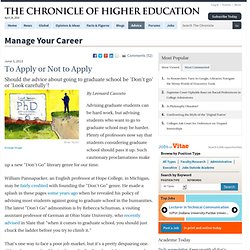
Hanging up their labcoats: Australia's new brain drain › Opinion (ABC Science) In Depth › Analysis and Opinion Faced with limited job opportunities, disenchanted young researchers are giving up on careers in science, writes Tim Nielsen.

By Tim Nielsen January is an exciting month for those medical researchers fortunate enough to have received grant funding for new projects in 2014. But as funding success rates continue to fall, a career on the grant treadmill is looking decidedly unattractive to a growing number of younger scientists. Last year, Professor Brendan Crabb of The Association of Australian Medical Research Institutes warned that "falling success rates on medical research grants will eventually reach breaking point and start seriously discouraging young researchers from sticking with their careers". I'm About To Join A Generation Of Jobless PhDs. News Special : Future of the PhD. Education: The PhD factory. Reform the PhD system or close it down. Doctoral degrees: The disposable academic. ON THE evening before All Saints' Day in 1517, Martin Luther nailed 95 theses to the door of a church in Wittenberg.
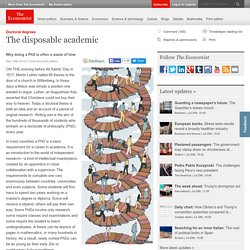
Fix the PhD : Nature. Give postdocs a career, not empty promises. Higher education: Not what it used to be. ON THE face of it, American higher education is still in rude health.
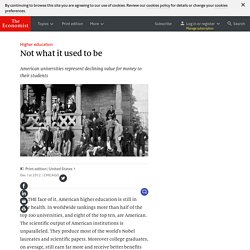
In worldwide rankings more than half of the top 100 universities, and eight of the top ten, are American. The scientific output of American institutions is unparalleled. They produce most of the world’s Nobel laureates and scientific papers. Moreover college graduates, on average, still earn far more and receive better benefits than those who do not have a degree. Nonetheless, there is growing anxiety in America about higher education. Concern springs from a number of things: steep rises in fees, increases in the levels of debt of both students and universities, and the declining quality of graduates. More debt means more risk, and graduation is far from certain; the chances of an American student completing a four-year degree within six years stand at only around 57%.
At the same time, universities have been spending beyond their means. Universities cannot look to government to come to the rescue. Science (2012): The Audacity of Graduate School. Sometimes my wife asks me whether I’m glad I chose to go to grad school.
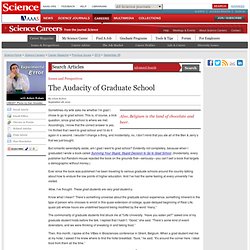
This is, of course, a trick question, since grad school is where we met. Accordingly, I know that the correct answer is yes, I’m thrilled that I went to grad school and I’d do it again in a second. I wouldn’t change a thing, and incidentally, no, I don’t mind that you ate all of the Ben & Jerry’s that we just bought. But romantic serendipity aside, am I glad I went to grad school? Evidently not completely, because when I graduated I wrote a book called Surviving Your Stupid, Stupid Decision to Go to Grad School. Ever since the book was published I’ve been traveling to various graduate schools around the country talking about how to endure the low points of higher education.
Where Higher Education Went Wrong. Popping the Higher Education Bubble.

Don't Go to Grad School. It's Time for Graduate Science Programs to Get Real - Commentary. By Amanda A.
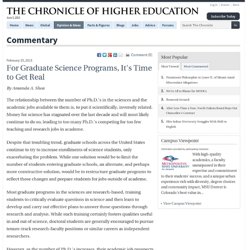
Shea The relationship between the number of Ph.D.'s in the sciences and the academic jobs available to them is, to put it scientifically, inversely related. Money for science has stagnated over the last decade and will most likely continue to do so, leading to too many Ph.D.'s competing for too few teaching and research jobs in academe. Despite that troubling trend, graduate schools across the United States continue to try to increase enrollments of science students, only exacerbating the problem.
Most graduate programs in the sciences are research-based, training students to critically evaluate questions in science and then learn to develop and carry out effective plans to answer those questions through research and analysis. However, as the number of Ph.D.' Along with the decreasing job prospects, the time spent as a graduate student and as a postdoc is increasing. "The 'S' in STEM is Oversold" Why Science Majors Change Their Minds (It’s Just So Darn Hard)